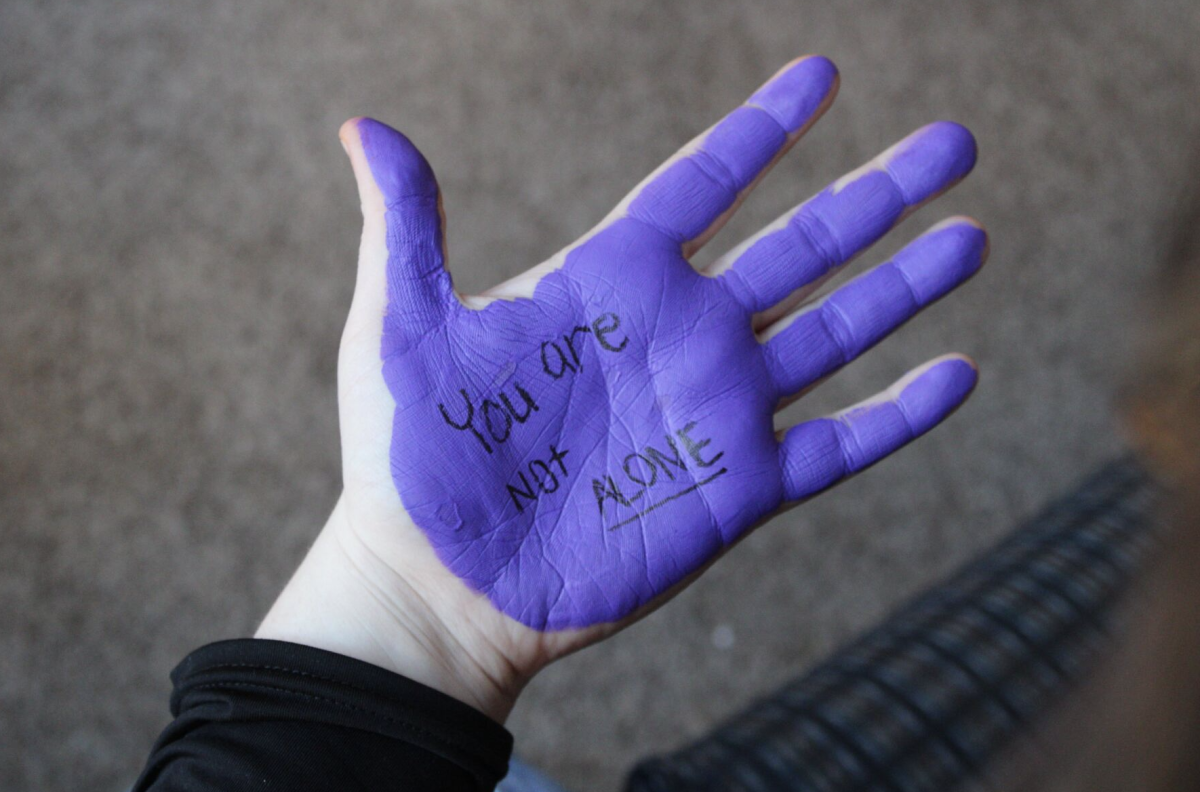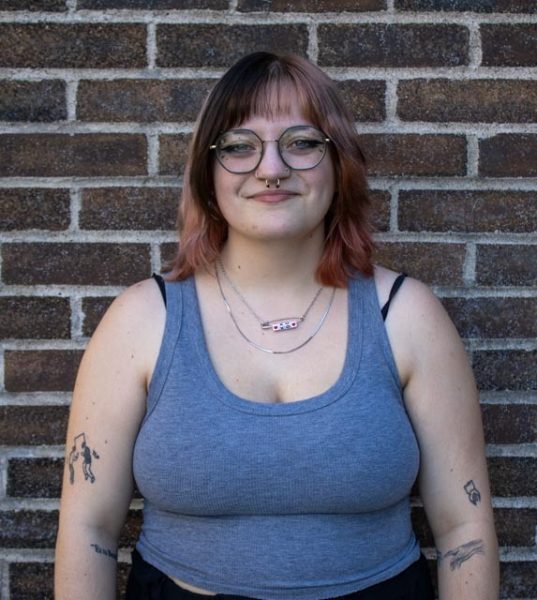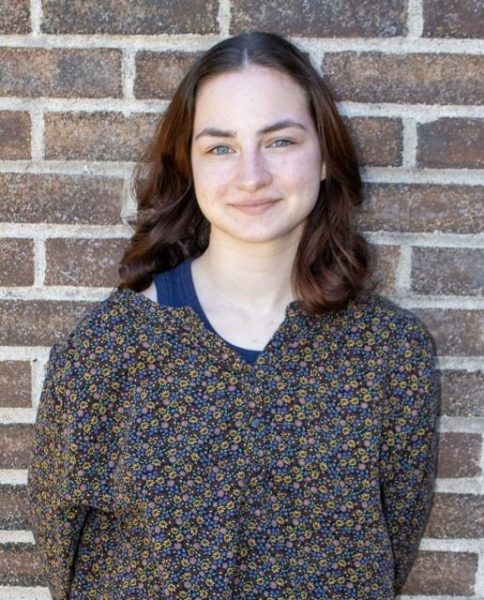When walking out of a class and having to pass the heart of Winona State University, a student doesn’t typically expect to see clothes on a line waving around in the harsh wind. On Friday, February 16th at the gazebo, clothes were placed on a clothesline to represent victims of sexual violence. Along with the clothes were anonymous stories of survivors here at Winona State.
This demonstration was done by Winona State’s for the purpose of allowing survivors to feel seen, and to prevent the Winona State community from overlooking this violence. Often at universities, survivors of these traumatic events do not feel seen. Rather, they often feel silenced by the circumstances. This demonstration allows survivors to be represented in a space where they would otherwise feel silenced.
A board member of the Winona State Reproductive Justice Club, third-year social work major Oluwadamilara De-Souza, finds that for many people it’s so easy to look at statistics and then forget about the survivors of sexual violence on campus. This demonstration was a chance for that to no longer be the case.
“Too often in university settings, the victims do not get any semblance of justice because they are more concerned about the perpetrator (statistically more often males). Whether they are athletes that the university wishes to keep raking in more wins to make them look good, or a tenured professor that the university is willing to look the other way from the harm they cause just because they have worked there for some years. It is disgusting and survivors are paying the price.” De-Souza said.
However, this demonstration sheds light on a bigger issue at Winona State, that being how survivors are treated by the University after they report a sexual assault.
Winona State has a Title IX office, as do many colleges in Minnesota and throughout the United States. The purpose of the Title IX office is to respond promptly to any issues regarding discrimination based on gender. The authority of the Title IX office extends to cases of sexual violence, and gender-based violence committed by students and faculty both on and off campus.
At Winona State there is only one Title IX, and because there are over 6,000 students enrolled at Winona State, that is a lot on one person. This is especially true when the one person in charge of Title IX is also in charge of Affirmative Action as well as Legal Affairs at Winona StateThis lack of extra hands in the Title IX office puts a strain not just on the position of Title IX Coordinator, but also on the survivors of sexual violence.
In the Affirmative Action plan for Winona State University, there is an emphasis on the coordinator’s promptness in providing information to the survivor and the perpetrator. Due to the lack of help within the Title IX office, many students who have reported sexual violence have felt that the process is harmful rather than helpful.
The process of reporting sexual violence to the Title IX office has been cited by many survivors as very tiresome due to how long and lonely it tends to feel. Though the purpose of the Title IX office is intended to make students feel safe and heard, (and during ongoing investigations), it often results in the exact opposite effect.
One anonymous survivor from Winona State who has gone through this exhaustive Title IX process feels as though Winona State isn’t helping them get through these traumatic times as well as they could.
“I feel like WSU has harmed my recovery and made me feel like I am a liar, or that I deserved to be treated this way. I felt isolated out of my community and forced to leave in order to protect myself.” (Source A).
Not only is the Title IX process exhausting and often retraumatizing for survivors, but it can also get very confusing. Often, survivors with an active case aren’t sure what they can and cannot share about their situation with the people in their life and around them. This can become extremely isolating to someone who is already struggling with their situation.
This feeling of isolation can be even more exacerbated when there are constant reminders of support for survivors around campus, yet the survivor doesn’t feel the support from Winona State.
Another anonymous student going through the Title IX process sees that Winona State is saying it will be there for students who are survivors, and yet they don’t feel that support themselves.
“The way this university handles people being assaulted on this campus so far has caused a lot more distress to people that had enough of it already, and for a university to put posters up saying they stand with victims and actively not do that needs to be magnified.” (Source B).
Survivors don’t feel the support that Winona State claims to have on posters and on their affirmative action plan which states, “Sexual violence is an intolerable intrusion into the most personal and private rights of an individual.”
Many survivors who have gone through the Title IX process have had their experiences minimalized. Survivors of sexual violence have already undergone extreme hardships, and this process doesn’t make it easier for them. The minimization of these traumatic experiences is common from many outside factors; however, students are feeling this specifically from Winona State.
Not only are survivors’ experiences minimalized, but they are also told that what they experienced is not “covered” in Title IX. Though in some cases this may be true, an anonymous student had studied up on the policies and knew that what happened to them was indeed assault under the definition provided through Title IX. However, this Winona State student was told that what they experienced was not assault and that there was nothing the Title IX office could do for them.
Though, if a student wishes to go through with a Title IX report, there are several pathways. Ranging from ways to initiate conversation between the Title IX Coordinator and a survivor, ways for both the survivor and the perpetrator to come to an agreement (with a facilitator) to determine how they should continue their separate lives on campus with minimal contact, and lastly a formal investigation and hearing.
Two options that are given to survivors through the Title IX result in no disciplinary action and allow the perpetrator to still reside on campus, however, these two options do not always provide support for the survivor through the possibility of being able to change schedules, housing options, and more. The option of these changes is dependent on the availability of there being another option at all. According to Winona State’s Affirmative action plan, these changes can be provided “if such alternatives are available and feasible.”
This dependency on availability could harm a survivor’s recovery because they may have to share classes, a workplace, or a residence with someone who put them through a traumatic event.
An anonymous student previously mentioned experiences regularly seeing their assaulter on campus, even though they are going through a Title IX process currently.
“That night that I was assaulted was horrific for me, and every single thing that I’m dealing with for Title IX right now pulls me back into that night and it has definitely affected me negatively. I see my assaulter on campus regularly,” They said. “I want future students to know that the Title IX office cares about their situation and will treat it with the utmost care and respect it deserves, but that is simply not happening right now.”
However, for students who have experienced sexual violence, there are other options besides going through the Title IX office and law enforcement. The Advocacy Center of Winona (ACW) has an advocate in Gildemeister 110, the OASIS Center. This is a confidential place for survivors to go with their story and get support they may want and need.
Karlee Langenfeld, a third-year psychology major here at WSU is an intern at the ACW as well as on the board for the reproductive justice club.
“The Title IX office does all of the legal paperwork and advising on the legal process through the university. All communications with survivors, investigations, and reports go through just one person. The ACW/OASIS advocates provide support whether that is emotional support, legal advice, and education on the process,” Langenfeld said.
There is also an anonymous website that has been set up by the Winona State reproductive justice club to help share the experiences to a larger audience. Whether it is sexual violence, harassment, or something else, it provides a space for survivors to share how their experience has impacted them as well as how Winona State has handled the situation. This website and more survivors’ stories can be found at standingwithwsustudents.com.
































